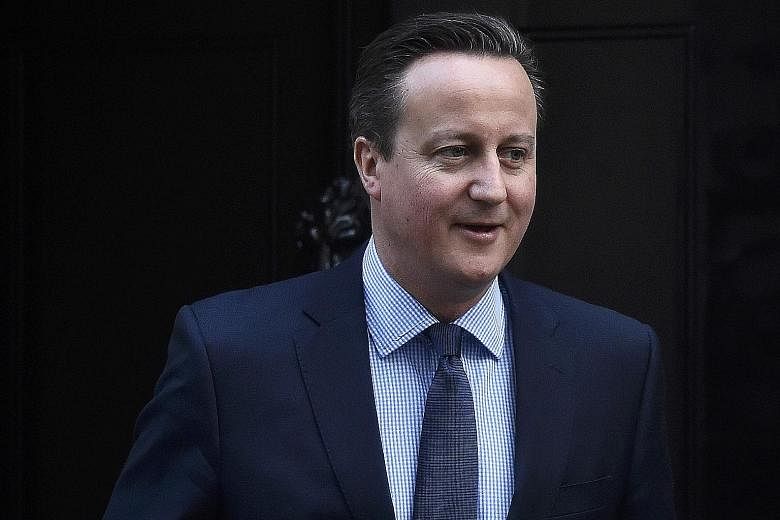When British Prime Minister David Cameron (above) started meeting other European Union leaders in Brussels yesterday, he sought to reconstruct Britain's terms of membership in the 28-country bloc. He is hoping to win concessions during the two-day summit that will pave the way for a referendum to be held in Britain as early as June, in which voters will decide whether or not Britain should remain in the EU. Here is what's at stake:
Q What does Mr Cameron want from the EU?
A The Prime Minister has asked for commitments on four broad policy issues: economic governance, social benefits for non-British citizens, competitiveness and sovereignty. In practical terms, that requires the EU to address bank oversight and how it shapes future financial laws, welfare payments, red-tape business regulations and the philosophical commitment in the bloc's founding treaties to an "ever-closer union".
On the last point, the EU will affirm that Britain cannot be forced into a tighter alliance. EU president Donald Tusk will try to get a comprehensive agreement in one summit because "to fail would be compromising our common future".
Q What if there is no deal at the summit?
A If leaders fail to reach an accord by the end of the month, it is unlikely Britain will be able to hold a referendum by the end of June.
The risk of a "Brexit" will increase if there is no agreement, not only because failure would show the difficulty of reaching a pre-referendum deal but also because the timing of a delayed vote would be unfavourable for the pro-EU side.
Q Will the British vote to leave the EU?
A The latest opinion poll by Ipsos Mori showed that 54 per cent of respondents said they would vote for Britain to remain a member of the EU, down 1 percentage point from January, and 36 per cent said they would vote to leave. About 63 per cent said they had definitely made up their minds while 35 per cent said they may change their minds.
"There's little movement in the public's views towards Europe - but still time for that to change, even though the public expectation is still for a 'remain' victory," said Ipsos Mori head of political research Gideon Skinner.
Q What are the consequences of a "Brexit"?
A The Confederation of British Industry joined 21 counterparts in other EU nations in urging Britain to remain in the bloc, saying in an open letter: "European business strongly supports continued British membership of a European Union that takes the necessary reforms to be competitive, outward-looking and continue delivering growth, jobs, peace, security and prosperity for all." If Britain leaves the union, it could cause short-term market turbulence and an "economic and political weakening" of both Britain and the EU in the long term, said Finnish Finance Minister Alexander Stubb.
HSBC Holdings chief executive officer Stuart Gulliver said the lender would probably move about 1,000 investment bankers to Paris if Britain withdraws from the EU. Six-month implied volatility for the pound versus the euro, a measure of anticipated price swings based on options, climbed to 11.94 per cent on Wednesday, the highest closing level since October 2011.
BLOOMBERG

